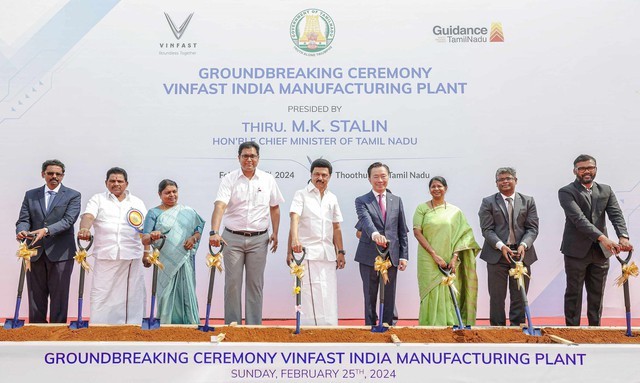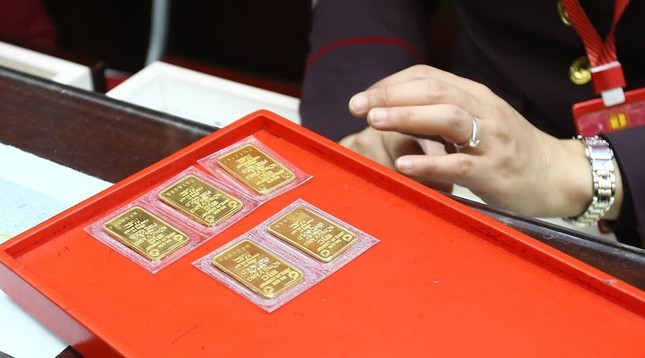On February 25, 2024, VinFast, the leading Vietnamese electric vehicle company, officially broke ground on its first integrated electric vehicle factory in Tamil Nadu, India.
Entering the Indian market is a significant step in VinFast’s global expansion journey, showcasing its ambition to penetrate the third-largest automotive market in the world. The initiative involves a substantial investment of up to $2 billion, with a commitment to invest $500 million in the first five years. The integrated electric vehicle manufacturing plant is expected to be operational by 2026.
Tamil Nadu, which is already a major automotive manufacturing hub hosting global giants like BMW, Hyundai, and Renault-Nissan, will become a leading electric vehicle manufacturing center, with a potential production capacity of up to 150,000 vehicles per year in the city of Thoothukudi.

Tamil Nadu Chief Minister M.K. Stalin, VinFast India CEO Pham Sanh Chau, and Tamil Nadu officials at the groundbreaking ceremony of the VinFast factory.
The Tamil Nadu plant will be VinFast’s third production project and the most significant investment in the history of the state. In addition to manufacturing facilities, VinFast plans to establish a nationwide dealership network in India to build a strong brand presence and connect quickly with customers across the country.
This initiative is a crucial step towards promoting green transportation in India, aligning with the ambitious goal of the Indian government to electrify 30% of personal vehicles by 2030. The Tamil Nadu government has pledged support for the project by providing land, stable electricity supply, and other infrastructure support. Moreover, the project is expected to create around 3,500 jobs locally, making a significant contribution to the local economy.
This investment plan presents VinFast with a golden opportunity to leverage India’s generous policies in positioning the country as a major global automobile export hub. Robust infrastructure, stable policies at both the central and state levels, skilled and young workforce, and a large domestic market make India an ideal location for VinFast’s ambitious expansion.
The Indian electric vehicle market is expected to reach $100 billion, making it a lucrative opportunity for global manufacturers. However, the market is still in its nascent stage, providing early movers like VinFast a unique chance to build a strong presence and brand loyalty.

Dr. Majo George, Senior Lecturer of Supply Chain & Logistics Management, School of Business, RMIT University Vietnam
VinFast’s entry into the Indian market is timely and strategic as it precedes Tesla’s planned entry into the Indian manufacturing sector. This timing gives VinFast a competitive advantage by establishing a foothold ahead of Tesla.
With India’s commitment to transitioning to electric vehicles, VinFast’s car sales in India have the potential to surpass those in Vietnam, provided the company effectively markets to Indian consumers.
Through attractive pricing and futuristic designs of its electric vehicle models, VinFast has the potential to capture a significant market share in the Indian electric vehicle market. This can drive the growth of the company amidst uncertainties in the US market.

The longstanding relationship between Vietnam and India further enhances VinFast’s potential in this new market. With Vietnam becoming a popular tourist destination, many Indians are familiar with VinFast and its vehicles. The cultural similarities between the two countries, reflected in the shared preference for SUVs, sedans, and other types of electric vehicles, including two- and three-wheelers, give VinFast a unique advantage.
Furthermore, VinFast has a significant opportunity to participate in the development of electric batteries, not only serving the Indian market but also the global electric vehicle market. Venturing into the Indian taxi market with VinFast GSM could be another lucrative avenue by capitalizing on a vast and growing segment.
VinFast should also focus on two other promising areas: heavy-duty vehicles and transportation. The company’s existing electric bus manufacturing capabilities align perfectly with the current trend among Indian state governments to transition from traditional buses to electric models. The heavy-duty transportation sector, particularly electric truck production, is another untapped area ready for exploration. With advanced technology and visionary leadership of Mr. Pham Nhat Vuong, VinFast is well-positioned to conduct further research and potentially dominate this segment. India’s open policies create an attractive environment for such innovative endeavors.
Overall, VinFast expanding into India represents a strategic breakthrough into one of the most populous countries and the fastest-growing electric vehicle market in the world. It reflects the company’s commitment to sustainable development and a vision of a transportation future free from emissions, bringing economic benefits and contributing to the region’s green energy transition.
Dr. Majo George – Senior Lecturer in Supply Chain & Logistics Management, School of Business, RMIT University Vietnam











































